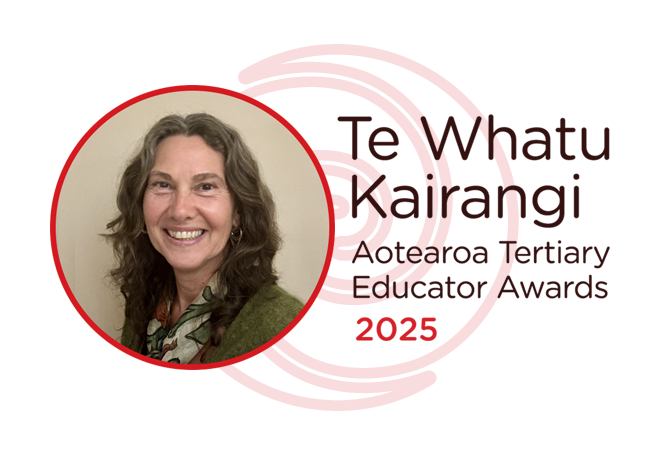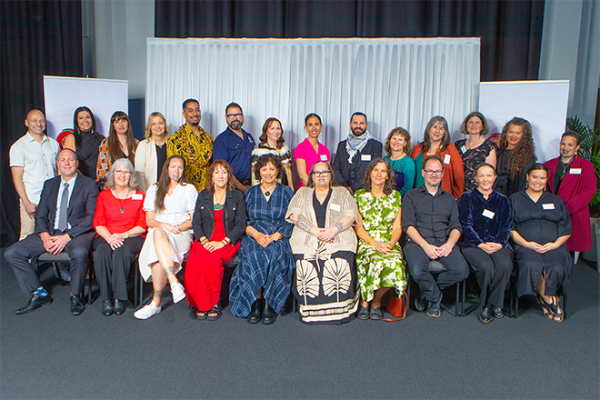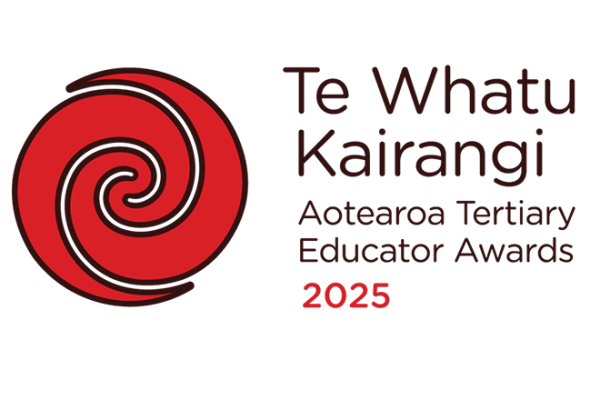Dr Antonie Alm
Enduring energy and inspiration for learners
General award winner: Innovation in learning, teaching, and curriculum
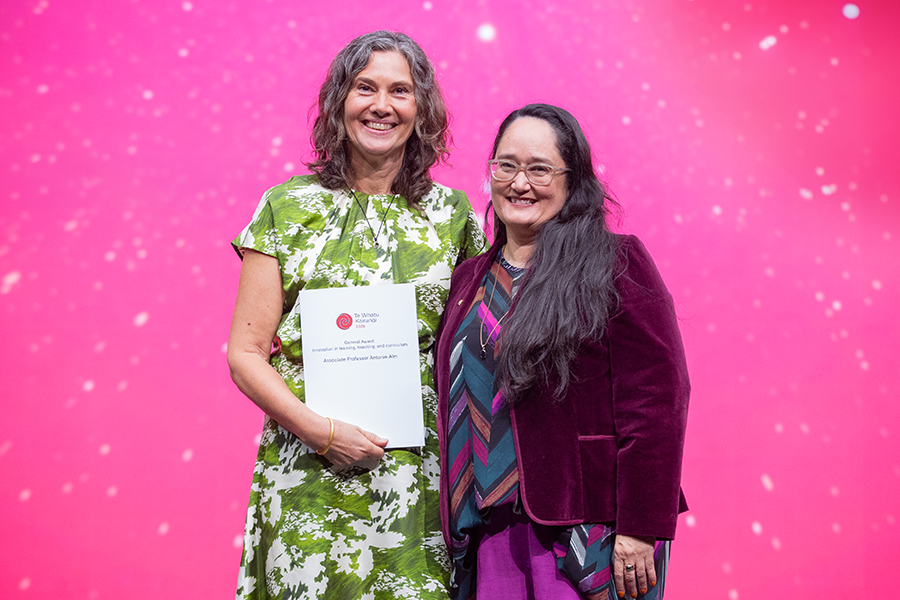
Associate Professor, Languages and Cultures, School of Arts, University of Otago | Otākou Whakaihu Waka
"The impact of my teaching continues to be felt long after students leave the classroom, influencing their confidence, engagement, and ongoing relationship with languages."
Through three decades of tertiary teaching, Antonie has worked to connect pedagogy, research, and learner experience in ways that expand the ways students learn languages and, in the process, imagine who they can become. She holds a PhD from the University of California, Los Angeles (UCLA) and completed her studies in German Language and Literature at the Université de Bordeaux III. She also holds a French teaching qualification from the École Normale Supérieure St. Cloud and has an extensive background in computer-assisted language learning. She began her teaching career in French at James Cook University in Australia before focusing on German when she came to Aotearoa in 1995. At this time, the country didn’t seem like an obvious hub for foreign language learning and the emergence of the internet was only just beginning to enter everyday use. Recognising both the challenge and opportunity this presented, Antonie introduced her students to email and online collaboration even before they became users of these tools in their native languages.
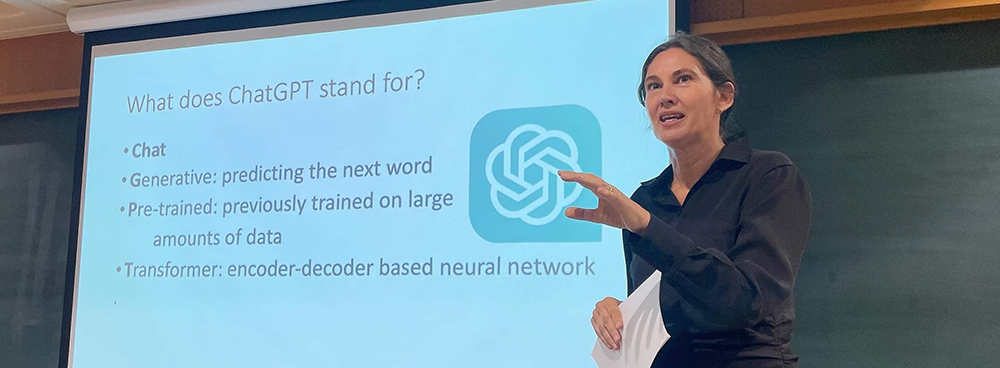
At the University of Otago, Antonie has taught German and Intercultural Communication, coordinated the German and the Languages and Cultures programmes, and led curriculum innovation. She also taught a postgraduate course in Computer-Assisted Language Learning (CALL), preparing future language educators to use digital technologies critically and creatively. Following the closure of the German programme, she transitioned to teaching French, where she continues her sustained career of pedagogical innovation. Her commitment to innovation dates back to her arrival in Aotearoa: she led her students in creating a German-language tourist webpage for Dunedin in the mid-1990s, before most university departments had an online presence. From internet-based course pages (in pre-blackboard days), she progressed to podcasting, blogs, social networking sites and streaming platforms - and now integrates generative AI tools. At each stage, she has used technology to invite expression, creativity, and critical reflection.
Antonie’s students are diverse in background and motivation; some are heritage learners reconnecting with their roots, others are complete beginners combining language study with humanities, science or commerce degrees. Antonie finds that, whether learners seek fluency for travel, identity or intellectual growth, they share a need for learning environments that support emotional connection. She ensures her courses meet those needs through relevant content and tasks that enable learners to bring their whole selves to the learning process. Her pedagogical approach builds on self-determination theory and motivational frameworks, understanding how learners develop visions of themselves as future users of the target language. A central concept in her work is intraformal learning - a term she coined herself - which she defines as the dynamic interaction between formal and informal classroom learning, often involving digitally-mediated, self-initiated engagement with a second language. Rather than treating formal and informal learning as separate spheres, she designs experiences that allow them to inform and strengthen each other. She believes the flow between formal and informal, planned and spontaneous, academic and personal, is where meaningful learning occurs. This concept has gained international recognition and is now referenced in current research on language learning ecologies.
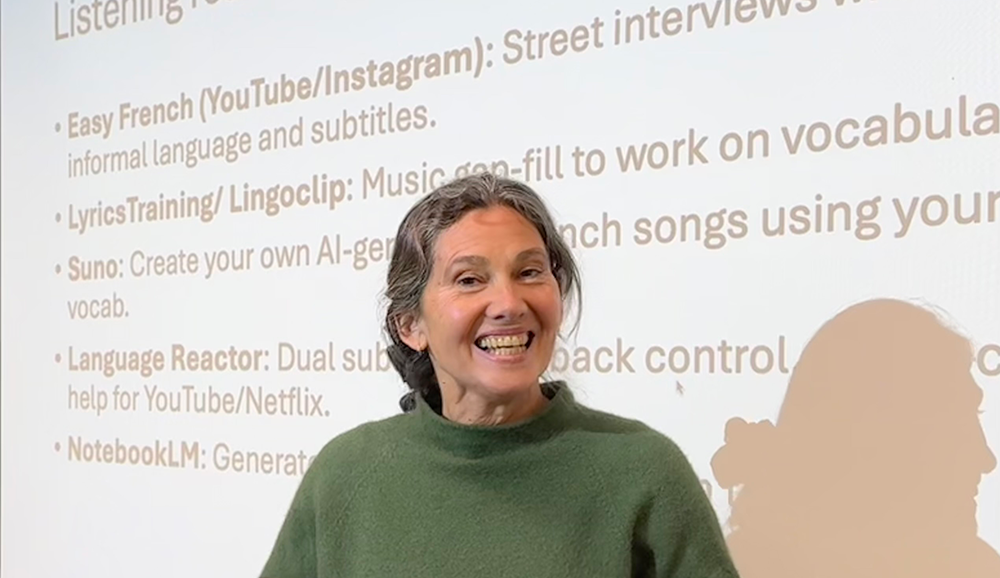
Experiences, such as teaching herself Spanish through mobile apps and learning Italian using voice-based conversational AI, keep Antonie grounded in the learner perspective. She knows firsthand that language learning is both a cognitive process and a deeply personal and affective journey. She encourages her students to bring their full selves to the learning process - their interests, frustrations, humour, and hopes. As one student described it, her classes provide "a safe space in which we could try, fail, and learn creatively." In 2013, she surveyed the use of social media (then Facebook) and found that students actively used the resource in their second language, yet this learning remained disconnected from their coursework. To close this gap, she integrated informal tools - such as podcasts, social networks, and video platforms - into classroom practice as catalysts for reflection and metacognitive engagement. This approach supports access and participation by validating the diverse ways students engage with language beyond the classroom. By exploring digital tools to increase access and flexibility, Antonie also creates opportunities that connect learners across different levels and backgrounds. These include events such as plays, musical concerts, weekly conversation groups, and end-of-year festivities, where students engage informally with peers and native speakers.
Antonie uses Netflix as a powerful vehicle for intraformal learning drawing on its multilingual content, subtitling features, and students’ binge-watching habits. Supported by a university teaching grant, a Netflix project allowed students to select a series and use a browser extension with dual-language subtitles, clickable translations, and adjustable playback speed. They documented their experiences in reflective blogs, creating a shared viewing culture that integrated entertainment and academic engagement. During the pandemic this activity became a lifeline, with students using their blogs not only to reflect on the series, but also to share emotions and create collective space for connection - building an emotionally resonant community of practice even when physically apart. When in-person teaching resumed, Antonie took her students off-screen and outdoors with weekly Spaziergänge – language walks around campus and through the botanical garden. The walks were an integrated language task. Students selected and read a German article on a current issue and prepared questions for the walk. Afterwards, they wrote blog posts, reinforcing vocabulary and expressions in a personally meaningful context. The walks supported not just language development but student wellbeing - hauora. Another opportunity for students has been virtual exchanges, such as in 2022, when her class worked with third-year students from Auckland and Leipzig Universities (Germany), funded by the German Academic Exchange Service (DAAD), with some student partnerships continuing beyond the course.
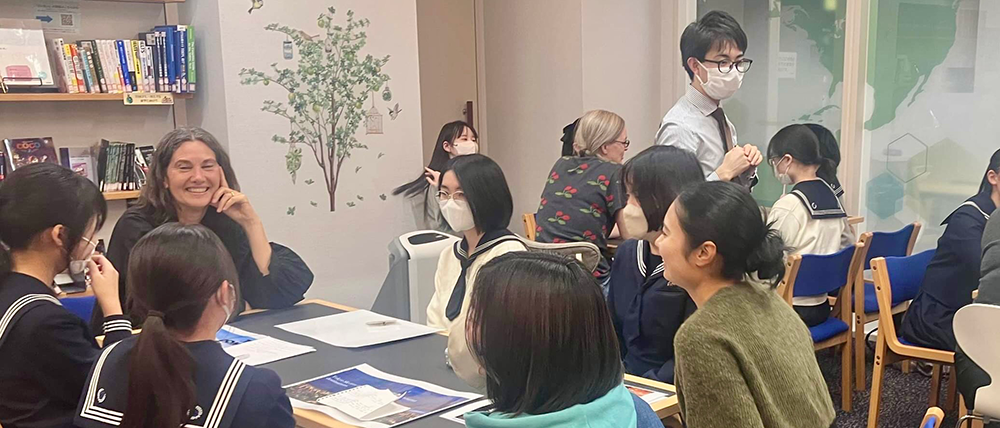
While at the University of Otago, Antonie has secured multiple teaching grants and led projects involving colleagues from the Spanish and Japanese sections, fostering cross-linguistic collaboration. Her machine translation literacy project resulted in workshops for all Languages and Cultures staff. She regularly presents at university-wide events, such as the Lessons Learned Symposium in 2022, where she conducted a workshop on AI in higher education - two weeks before the emergence of ChatGPT3.5. Her leadership extends into national and international professional communities. In 2020, she brought together researchers from across New Zealand to host the Applied Linguistics Conference during a narrow window between lockdowns.
Antonie has long-standing collaborations with national organisations, such as the New Zealand Association of Language Teachers (NZALT) and the Goethe Institute. She has given talks to high school teachers, language academics, and educational leaders, including a SEAMEO-STEM-ED webinar with over 7,000 live viewers. She has presented seminars, lectures and workshops at universities in Tokyo (2023) and Paris (2024), collaborating widely, including co-editing Insights into AI and Language Teaching and Learning (2025), and Transitions in CALL.
Looking forward, Antonie is developing approaches that combine open educational resources with advising-informed support structures, empowering learners to chart their own paths and building resilience into language education.
“My teaching integrates formal and informal learning, where classroom, community, and digital practices blend.”
